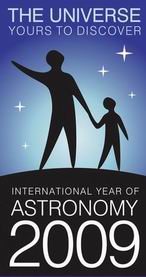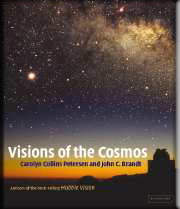 |
 The SpaceWriter's Ramblings |
 |
||
|
|
|
|
||
|
Anything and everything about science, especially astronomy and the cosmos. NOTE: This blog has migrated to a new address. Please update your favorites link accordingly.Visit my web site at Posting times are Powered by
|
8.23.2007 "Scientists Believe..."Here's a pet peeve of mine, but with a little background. I read a lot of science press releases each week, and many more science stories from various online (and tree-based) sources. At least one (and usually more) of those sources winds up saying something like, "Scientists believe that... " in an effort to get across the idea that the scientists are describing a discovery or knowledge they have about a given topic of research. What bugs me about that usage is that it isn't correct, particularly when it gets applied to some facts that scientists (doctors, physicists, chemists, biologists, etc.) are trying to get across to the public. The writer should have said, "Scientists think... " or "Scientists know... " or something that indicates definite knowledge, not hopeful belief. (Unless, of course the scientist in question says, "We believe we can find the cure for cancer in this generation." That IS a correct usage.) What bugs me about "believe" vs. "think"? It's sloppy language usage. Here's the Dictionary.com definition for believe: "to have confidence in the truth, the existence, or the reliability of something, although without absolute proof that one is right in doing so: Only if one believes in something can one act purposefully." (Italics mine.) Here's the definition for think: "to have a conscious mind, to some extent of reasoning, remembering experiences, making rational decisions, etc.; to employ one's mind rationally and objectively in evaluating or dealing with a given situation." Using the word "believe" puts in an element of uncertainty that often is at direct odds with what the scientist actually said or has discovered. Using "think" or "know" expertly expresses exactly what the data support. Let's explore that a bit. Let's say that a planetary scientist discovers a new planet in the outer solar system. That discovery is written up in a press release and the scientist says, "We know from our spectra that the surface of this world is made up largely of water ice." It's absolute fact, he or she knows it, and after we read the story, we know it. We can look at the spectra and the data is right there, telling us that the surface has water ice on it. Yet, often enough, I'll see the news stories based on the press release (and even interviews with the scientist), and somewhere in the story, the reporter writes, "The scientists believe that there's water ice on the surface of this new world." (Or something like that.) No. No. No. There's no "belief" about it. It's a fact. Go back up and read that definition of "believe" again and think about it. Saying "believe" is simply the wrong language to describe a scientific certainty. Now, if you wanted to say something like "Bobby believed that the Big Dipper was his favorite constellation" or "The Elbonians believed in the myth of Atlantis" that would be entirely proper because then there IS confidence in some truth or reliability of some information but there's no data or proof of the stated belief. It's a fine point, but one that we should all pay more attention to, because science does deal in precise language and measurements. "Belief" is not part of the scientific process, but having factual knowledge is. Or here's another way to think of it. I'm a science writer, I have a degree in journalism, I work as a freelance editor, and I have experience working at at a magazine and a newspaper. Therefore I know something of how these professions work. It is entirely right for me to say, "I know that newspapers work on deadlines" because I experienced it and it goes on to this day. I also know from my experience that editors change stories that reporters turn in for publication (or that they get from press releases). They do this for many reasons, but usually to tighten them up or replace repeated words, or to clarify something. For example, a writer that I once edited used the word "that" as much as possible. However, it gets tiresome to see the same word over and over again, so as an editor, I looked for words to replace "that" to help the meaning along. So, if I see a story where the word "believe" is substituted for the words "think" or "know" when referring to something that scientists DO think and DO know, I would be absolutely correct in saying, "I believe that the editor substituted the word "believe" for the word "know" because the writer may have used the word "know" too many times." I could also just as easily say "I believe the writer used the word "believe" because he or she didn't know better." I can't say that I "think" the editor or the writer did it because that would imply that I have direct knowledge of what that editor or writer did. But, I can say that I "believe" it happened, because while I don't have direct knowledge, I do have a pretty high confidence level that it happened. Pedantic, yes. Correct, yes. Science writing demands as much precision as the subject we're writing about. I don't believe that. I KNOW it. Labels: correct language usage, pedantic, pet peeves, science writing posted by CCP on 8/23/2007 02:37:00 PM | * |

Earth Hour! Do it for the Planet!
Blog RollPlanetarium-relatedLoch Ness ProductionsPurveyors of fine planetarium shows, music, and services. INTENSELY Good Space Music from a master in the genre! My cool astronomy cause: ScienceThe sites below belong to space and astronomy enthusiasts. I make every effort to check them and make sure they are still appropriate. However, I am not responsible for their content, nor do I endorse any of it by simply linking to them. As with all Web surfing, please exercise caution. Adot's Notblog A fellow traveler blogger and astronomy enthusiast! Astronomy Blog An astronomy blog pondering the big questions Astronomy Cast Astronomy Podcasting from Pamela Gay BadAstronomy.com Bad astronomy discussed and debunked along with fun stuff about really good astronomy! Chris Lintott's Universe Musings from an Oxford Astronomer. Cosmic Variance Random Samplings from a Universe of Ideas. Dave P's Astronomy blog Observational Astronomy and other TidBits European Southern Observatory Fine Ground-based astronomy images. Gemini Observatory Fine astronomy in infrared and visible wavelengths. Griffith Observatory's page. I wrote their exhibits! Observing The Sky Nightly Observation Reports from dedicated skygazers. The Official String Theory Web Site. Time to feed your mind! Pharyngula Evolution, development, and random biological ejaculations from a godless liberal. Cast off your blinders and come on in! Science Made Cool A compendium of discoveries, inventions and commentary. Slacker Astronomy Astronomy with a Slacker Twist. Space Telescope Science Institute The best from Hubble Space Telescope The Eternal Golden Braid Astronomy, Space Science, and Science Fiction Commentary. The Inoculated Mind Bills Itself as a weekly science mindcast. Thought-provoking, honest. Truth. UniqueThe Hairy Museum of Natural History
|




